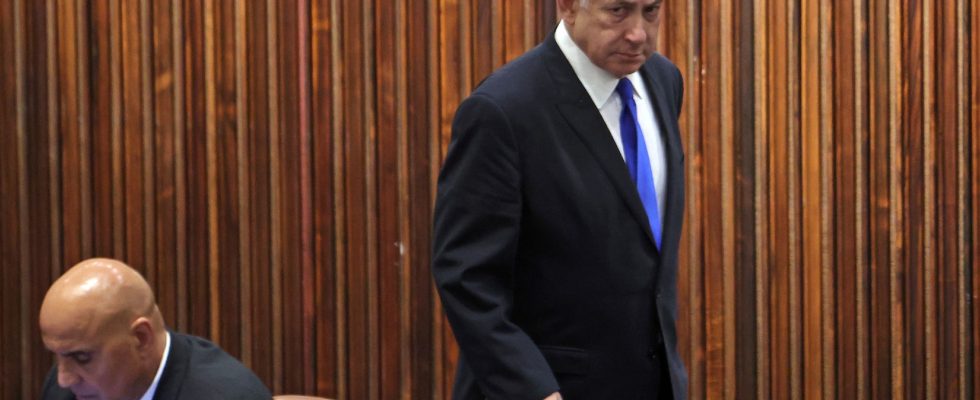A wave of peace seems to envelop the Middle East. In a region accustomed to conflicts and tragedies, the current period takes on the air of sweet utopia: the great Saudi and Iranian rivals are talking to each other again after seven years of cold war, which leads them to put an end to the war which is ravaging the Yemen since 2014. Old enemies talk, unnecessary deaths stop. “It’s cultural, smiles a diplomat on the spot: in the Middle East, even after years of war, everyone continues to talk to each other and we can wipe the slate clean if everyone finds their benefit.”
But the rapprochement between Iran and Saudi Arabia, negotiated under the aegis of China last month, is not only happy. In this new configuration, Israel finds itself very lonely, while Benyamin Netanyahu had two diplomatic priorities: normalizing relations with Riyadh and fighting against Tehran’s nuclear program. “For Israel, this Iran-Saudi Arabia rapprochement is a blow to the process of normalizing its relations with the Arab world, underlines David Khalfa, co-director of the North Africa and Middle East Observatory. of the Jean-Jaurès Foundation. And for Benyamin Netanyahu, it’s a bitter personal failure, a real snub.”
Biden ‘very worried’ about health of Israeli democracy
Since his return to power last December, it is actually the whole diplomatic strategy of “Bibi” Netanyahu that is collapsing. The Israeli Prime Minister hoped to ride on the success of the Abraham Accords, which normalized the relationship of the Jewish state with several Arab countries in 2020. But his alliance with the far right and the racist provocations of certain ministers cool these new regional partners, notably the United Arab Emirates. If, behind the scenes, the business continues – a customs agreement was signed at the beginning of March between Abu Dhabi and Tel Aviv – the leaders of the region have vocally condemned Israeli policy since the beginning of the year.
And they are not the only ones: the great American ally keeps its distance from the Netanyahu government and its highly contested overhaul of the judicial system. At the end of March, Joe Biden publicly said he was “very worried” about the health of Israeli democracy, adding: “they cannot continue on this path”. Unprecedented freezing cold between Washington and Jerusalem. “Netanyahu’s success in the legislative elections was a Pyrrhic victory. He has never seemed so weakened, points out David Khalfa. Hostage and accomplice of an anti-Palestinian and anti-liberal extreme right, he finds himself at the door – false with the values defended by his Western European and American allies. Diplomacy was one of his strengths but today he is no longer welcome in the United States (while Biden is a pro-president). Israeli) and persona non grata in the Gulf.”
This apparent isolation worries the Israeli general staff, as does the image given by the monster demonstrations inside the country. In early April, the Jewish state was targeted by rocket fire from Lebanon and the Gaza Strip, triggering fears of a grouped attack by Hamas, Lebanese Hezbollah and Iranian militias. “Our enemies may think that Israel is weaker because of its internal debates, but that will not succeed, Israel is strong, assures us Haim Waksman, Israeli ambassador to France. We have been able to prevent many attacks terrorists in recent weeks.”
If he does not deny the internal divisions, the diplomat believes that Israel “is not going through a period of weakness” despite the demonstrations which bring together hundreds of thousands of Israelis every week. “This is an essential debate on our values, which testifies to the strength of Israeli democracy”, prefers to be positive Haim Waksman.
The return of Bashar al-Assad, a headache for Israel
Another development worries the Jewish state, north of its border. Syrian dictator Bashar al-Assad, isolated since 2011, is making a comeback on the regional scene. Tunisia, Oman, Saudi Arabia, even Turkey… The autocrat, whose civil war has caused more than 500,000 deaths, sees his regime return to favor with his neighbors, benefiting from a sudden burst of compassion after the earthquake of February 6. Assad is expected to be invited to the Arab League summit in Riyadh next month, the final nail in the coffin of his regional isolation.
Supported at arm’s length by Tehran in recent years, the Syrian dictator leaves control of entire territories to Iranian militias, close to the northern borders of Israel. His return to favor does not reassure Israeli diplomacy, which sees in it a legitimization of Iran and continues to refuse the “normalization” of the Syrian regime. “Bashar al-Assad should not be rehabilitated, confirms Ambassador Waksman. Assad remains the same Assad.”
Beyond the official line, adjusted to that of the West, the Assad case is debated in Israel. “For some, the ‘optimists’, normalization [de Damas avec les pays arabes] reduces the Syrian regime’s dependence on Tehran and it is better to have a stabilized regime than a failed state in which pro-Iran militias proliferate, explains David Khalfa. For the others, the ‘pessimists’, it is already too late and the vassalization of the Syrian regime by Iran has largely begun. They believe that Saudi Arabia made a miscalculation by allowing Assad to diversify his sources of funding without getting the Syrian dictator to loosen the stranglehold of his strategic relations with Tehran.” Faced with dazzling regional developments, Netanyahu urgently needs allies, inside and outside his borders.
